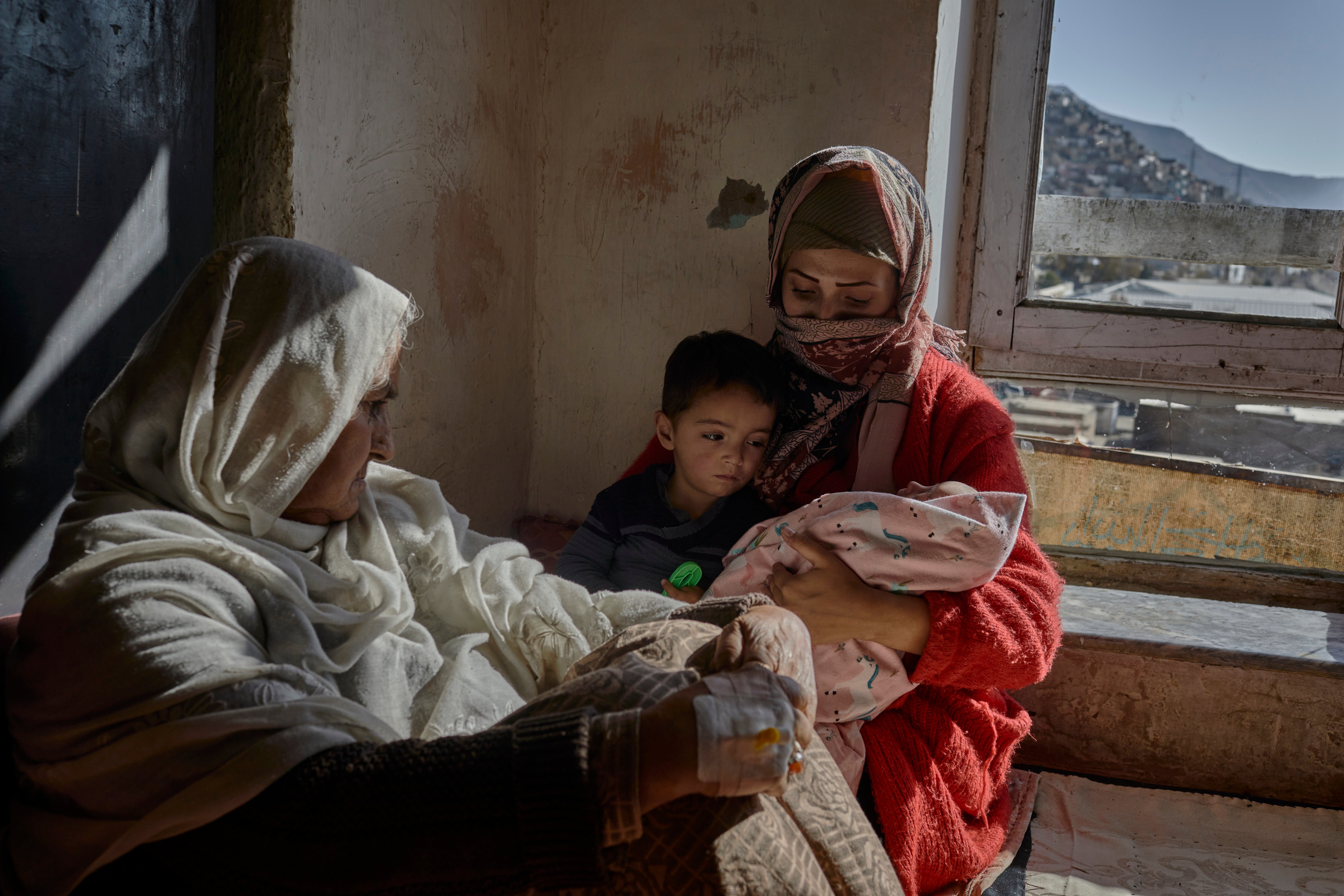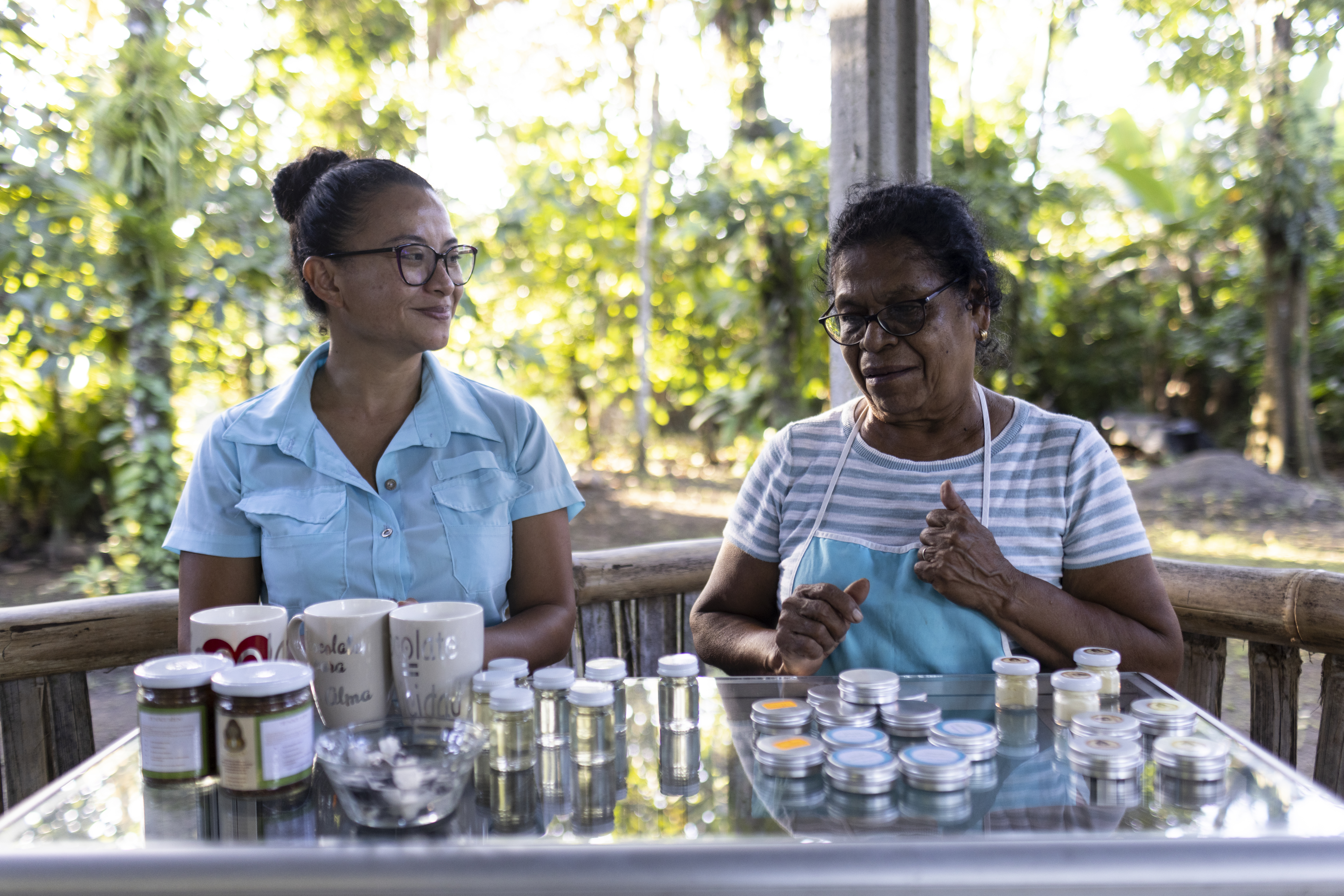Despite nearby clashes, refugee life continues as usual in eastern Chad
Despite nearby clashes, refugee life continues as usual in eastern Chad

MILE REFUGEE CAMP, Chad, 29 Dec. (UNHCR) - The 27-year-old Sudanese refugee woman is lying on a mat on the floor of her tent. Covered with a thin blanket, with a shawl over her shoulders, she is barely moving. The woman, Fatima,* scarcely glances at the nurse and the UNHCR community services officer who come in to take care of her.
"My back is hurting and I have pain in my arms, my legs and all over.... I can hardly walk," Fatima starts telling the nurse in a whisper. "Two men on camels ... nomad people attacked me and beat me with sticks. They walked all over me."
Three days earlier the mother of two was raped by two men while collecting firewood outside Mile refugee camp in eastern Chad, where she lives with her family. When she didn't return to the camp, her family searched for her and found Fatima unconscious in a field.
At first she refused to report the rape, fearing the reaction from neighbours and family. Rape is not talked about openly in Sudanese society - not even among the women. But after three days, Fatima's condition worsened and her family went to the camp's health clinic for help. A nurse and a UNHCR community services assistant go to Fatima's tent to make sure she gets good health care, proper medical tests and psychological counselling, and to report the crime to the authorities as well.
"Something as simple as collecting firewood to cook dinner for the children happens to be a dangerous activity for women refugees in eastern Chad," says Béatrice Danezoune, the UNHCR community services assistant. "Too often they are victims of violence and rape. Although refugee women are very well aware not to go alone outside the camp but only in larger groups, some, like Fatima, just venture on their own." To prevent violence against refugee women, UNHCR has put in place organized deliveries of firewood inside the camp, but some women venture out anyway.
Béatrice is a 23-year-old Chadian woman working for UNHCR in Guéréda's field office. Two major refugee camps are located near the town of Guéréda - Mile (pop. 13,063) and Kounoungou (11,393). Béatrice is among the dozen or so community services assistants working for UNHCR in eastern Chad. Their tasks vary from providing training to refugees, to making sure that vulnerable refugees have what they need to live peacefully in the camp. It is also her job to report rapes, domestic violence cases and to make sure the authorities chase the culprits.
Despite clashes between Chadian forces and armed groups along the border in recent weeks, life continues as usual in refugee camps in eastern Chad, where some 200,000 refugees from Sudan's Darfur region live in 12 camps. Humanitarian aid workers are as dedicated as ever: food distribution, education and health services are provided; protection services are ongoing. Following one UNHCR community services assistant for one day is an eye-opening experience.
In the course of a day Béatrice deals with many issues. The refugees consider her a problem-solver. Rape victims, domestic violence, genital mutilation, forced marriages and lost refugee cards - these just a few of the problems facing Béatrice and her colleagues every day.
Coming out of Fatima's tent, Béatrice barely has time to recover from the very sad story she has just heard before other issues bombard her. Lost or out-of-date refugee identification cards are the most common complaint.
An older woman greets her - "Salam aleykoum" - and they inquire about each other's family, as is usual here. Then the woman comes to the heart of her problem. "I need another ration card, please help me. I was not in the camp for the registration and I don't have enough to eat until the end of the month," the woman says in a tired, imploring voice.
Béatrice looks at the card, checks both sides and, with the precision of someone who has heard similar requests many times, she reassures the older woman and recommends that she sees the CNAR (Commission nationale d'assistance et de réinsertion des réfugiés), the Chadian authority in charge of refugees and of their registration. UNHCR works side by side with CNAR in refugee camps to make sure all refugees are accounted for and given the proper refugee documents.
It is midday and Béatrice has to rush to the camp community hall where she joins partners from the International Medical Corps giving a workshop to midwives. Learning the proper ways to take care of women in childbirth and their newborn babies is crucial for midwives in refugee camps. For pregnancies with no serious complications, refugees always give birth with the help of a midwife. The majority of deliveries take place at home, in a tent.
Béatrice's role in this workshop is to sensitize the participants about rape victims, sexual and gender-based violence against women, and female genital mutilation. In addition to their other duties, midwives are often also the ones performing the controversial female genital mutilation (FGM) on young refugee woman.
"Midwives often see and take care of rapes victims when they get pregnant, or FGM victims as well," explains Béatrice is a very calm and relaxed voice, making sure not to offend the some 20 refugee midwives taking part in the workshop. "You are at the forefront and you have to report rapes when you hear about it. These women need our help and psychological care as well. We can provide that."
Béatrice also explains the dangers of FGM and the consequences it can have later in life for these young women - severe pain, prolonged bleeding, infection, infertility and sometimes death.
Recent UNICEF figures show that an estimated 3 million girls in sub-Saharan African and the Middle East suffer genital cutting every year. In a recently published United Nations Children's Fund report, FGM is described as
"A traditional practice believed to enhance a girl's beauty, honour, marriageability, social status and chastity. Parents encourage cutting so that the family honour and the girl's best interest are protected."
Béatrice's presentation on the dangers of FGM is very well received. The midwives have questions and they all approve and nod at what is being said. However, Béatrice knows the reality too well. In some refugee camps in eastern Chad, FGM is performed on 90% of the young women. The traditional practice among Sudanese is difficult to halt.
"Last month one midwife performed excision on seven young women," Beatrice says. "Although UNHCR and health partners keep sending the message constantly, the traditional practice in Mile and Kounoungou refugee camps is still alive and well."
Béatrice in her own quiet way, keeps sending the message to the midwives she sees every day in the two camps. She strongly believes changes will happen when refugee communities - girls and boys, women and men - are more knowledgeable and can make their own choices about their lives.
For this UNHCR Community Services Assistant in a refugee camp it has been a typical day - but certainly not an ordinary one.
* Name changed to protect identity.
By Ginette Le Breton in Mile and Kounoungou Refugee Camps, Chad








